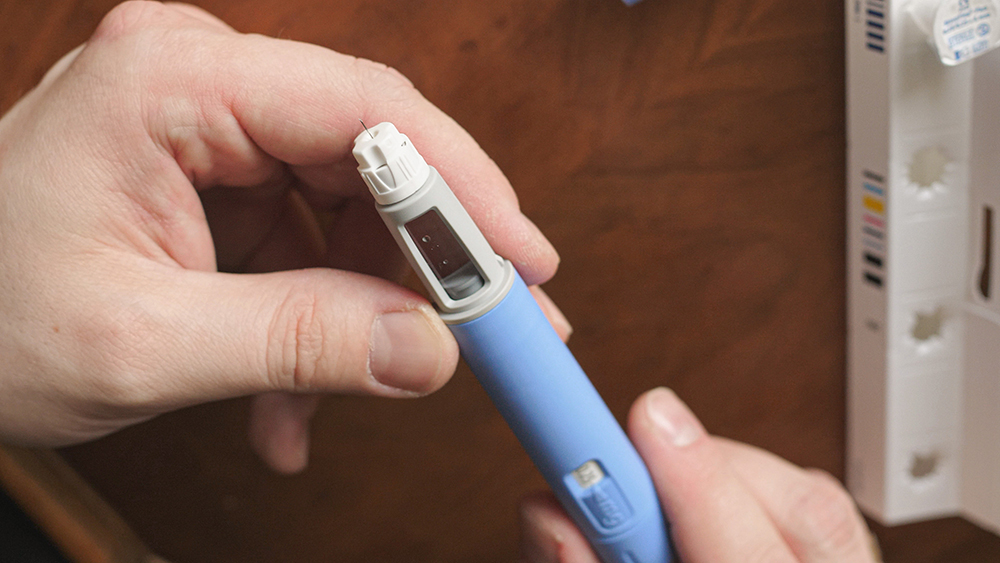 Semaglutide, Tirzepatide, Ozempic®, Wegovy®, Mounjaro® – There’s a lot of noise and confusion out there about the most talked-about medications since Viagra! I’ve been using the GLP-1/GIP agonists with patients as part of our Metabolic Repair program for a couple of years now, so I thought I’d share what I’ve learned about them: the hope, the truth and the lies, and what works and what doesn’t.
Semaglutide, Tirzepatide, Ozempic®, Wegovy®, Mounjaro® – There’s a lot of noise and confusion out there about the most talked-about medications since Viagra! I’ve been using the GLP-1/GIP agonists with patients as part of our Metabolic Repair program for a couple of years now, so I thought I’d share what I’ve learned about them: the hope, the truth and the lies, and what works and what doesn’t.
Is there really a shortage?
The media would like you to think there is a critical shortage of these medications, and that anyone who is using them for weight loss is a selfish and terrible person. The truth is, there was an unexpected demand for them as people caught on to how effective they were for weight loss, and the drug companies that manufacture them had to increase production. There was a temporary shortage, and during that time this class of medications was put on the drug shortage list by the FDA and compounding pharmacies were allowed to make generic versions of them. These specialty pharmacies were legally compounding semaglutide prior to the shortage because they combined it with methylcobalamin (B12) so it fit under the “not commercially available” umbrella, which is why compounding pharmacies exist to start with! So the TRUTH is there was a shortage of the brand-name medications, production has caught up, and there was never a shortage of the generic version. Now that the “shortage” is over, the FDA and the drug companies are eager to shut down compounding of this class of drugs. Can you guess why?
How does it work?
All of the brands out there (Ozempic®, Wegovy®, Mounjaro®, Saxenda®, Victoza®) do essentially the same thing: mimic and enhance normal cellular signaling in response to meals. The reason it works is because it overrides a person’s normal response, which in the case of obesity and metabolic conditions like diabetes and PCOS, may not be working right anyway. By affecting the rate at which your stomach empties, insulin production, blood sugar, and the appetite and fat regulating hormones leptin and adiponectin, it works to regulate blood sugar and insulin production, reduce appetite, reduce fat storage, and possibly increase fat burning. All good things, right?
What are the side effects?
All of the news articles I’ve read this week would like you to think we are all going to suffer miserably if we use this drug. Here’s the catch: nothing is free! In exchange for what feels like effortless weight loss, there are unavoidable side effects. Nausea, acid reflux, constipation, weakness, dizziness, and rapid heart rate are the most common. In addition to losing fat, many people also lose valuable muscle mass. Rapid weight loss can result in loose skin and noticeable facial aging. You might finally lose that potbelly, but at the expense of your cheeks and youthful profile. However, when done correctly, these side effects can be minimized, and you can lose weight safely and improve your metabolic health.
What happens when you stop using it?
Many people are afraid to come off the medication. The experience of a noticeable lack of hunger and finally not thinking about food all the time is liberating. When you stop the injections, your appetite comes back and that can feel a little scary. If you go back to eating like you did before, you will gain the weight back.
Can you keep using it or stay on it forever?
There is no evidence that long-term use of the GLP-1/GIP class of medications is dangerous. What I’ve seen is that over time people become less responsive to it. I think it’s due to up-regulation of an enzyme that degrades it (dipeptidyl peptidase 4, or DPP-4). It may still work to regulate blood sugar, but the appetite suppressant effect wanes with continued use. So, repeated use of it for weight re-gain may ultimately backfire.
So, why use it at all?
Despite all the negative press, I feel like the GLP-1/GIP agonists are extremely safe and useful, and one of the best tools out there for weight loss. However, in order to be successful, not regain the weight, and come out healthier as well as thinner at the end, you have to do it right!
Fix your eating!
Take advantage of your newfound willpower, reduced appetite, and ability to resist cravings by focusing on eating clean and minimally processed foods. STOP the sugar and artificial sweeteners, empty carbs, excessive alcohol, and toxic oils and fats. Let your taste buds get accustomed to real food without all the preservatives and artificial flavoring. START eating earlier in the evening, 2-3 hours before bedtime. STOP snacking after dinner. Get used to pure water as your beverage of choice. Incorporate high quality protein and nutrient dense foods into every meal to nourish your body and maintain muscle mass. As an aside, my patients also tell me their cravings for alcohol and nicotine go away, too! If you make these changes while you are on the program you can turn them into habits and make it your new normal. Continue this way of eating 90% of the time to maintain your results.
Fine-tune your dose!
To do this correctly you have to find the dose that works for you. The brand name medication comes pre-programmed with dosing that is hard to adjust. The compounded variety is flexible. We calculate your dose based on your response and severity of side effects. You want to have some appetite, not be totally repulsed by food. Starvation is not the goal here! That will only cause problems by forcing your body to dip into muscle for the essential amino acids you need for normal cellular functioning. It will also induce a stress response in the body, which will lower your metabolism by increasing reverse T3, blocking normal thyroid regulation of cellular energy use. This is why I insist on my patients checking in at least every 30 days for body composition testing, dietary review and troubleshooting side effects! We will often recommend supplementation of protein and targeted nutraceuticals to facilitate your success. We are aiming for visceral and subcutaneous fat loss while preserving muscle.
Keep moving!
If you were already active before starting the medication, don’t stop. You may need to modify the type, timing, or duration if you are experiencing side effects such as weakness, dizziness, or rapid heart rate. If you were not exercising regularly before, incorporate it now. Resistance training, not cardio, is key! As a beginner, simply walking at an incline outside or on a treadmill is a great way to maintain muscle in the lower body. A basic exercise routine using free weights or your own body weight as resistance is easy to do and only takes minutes a day. There are numerous apps and online resources for resistance training. If you don’t use your muscle, you will lose it along with fat on this medication. If you lose too much skeletal muscle, your basal metabolic rate will drop and it will be harder to maintain your weight when you come off of it. This is why the body composition check-ins are so important!
Stay hydrated!
These medications also blunt your thirst mechanism. It is important to get your water in every day. As you lose weight, you mobilize toxins that have been stored in fat and you need to flush them out. In addition, hydration helps minimize side effects like constipation, rapid heart rate, weakness, and dizziness. A word of advice, though: don’t drink a lot of water with meals. Filling up with water while eating increases the chance of nausea and reflux. Drink between meals.
Be aware!
Finally, as safe and effective as these medications are, there is the chance of a serious complication like pancreatitis, gallbladder dysfunction, or even thyroid tumors. The gallbladder can be affected because it contracts and releases bile when you eat, so by not eating as much, the bile can get thick and sludgy. Pancreatitis can develop because of the stimulating effect of the medication on the islet cells of the pancreas that produce insulin. Finally, thyroid tumors developed in rats on high doses in a study, but as of today, there have not been reports of any tumors in humans.
Summary
To summarize, these medications are not a quick fix for obesity and should not be used as vanity drugs. When used correctly and with proper medical oversight, they are incredibly helpful for weight loss, improved metabolic function, and to develop and solidify healthier habits. However, you have to be ready and willing to make a commitment to yourself that you will make the proper lifestyle and dietary modifications along the way to come out lighter and healthier on the other side, and stay that way!
1/28/2023 by Dr. Katherine Birchenough
